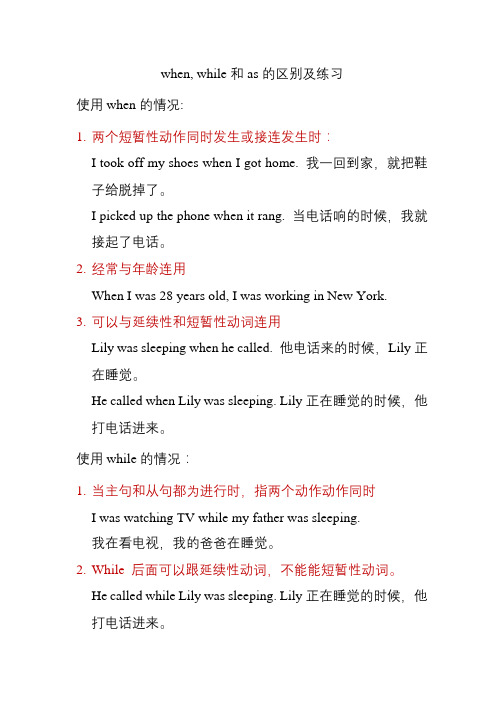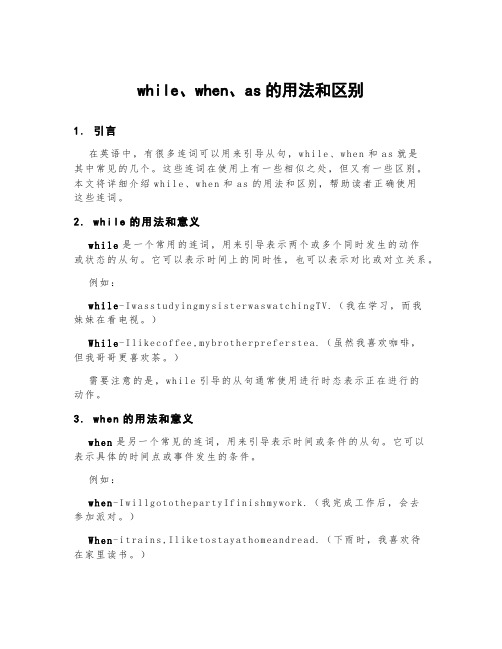第七 when while as 区别及练习
while、when和as的用法区别教案资料

w h i l e、w h e n和a s 的用法区别as when while 的区别和用法as when while的用法一、 as的意思是“正当……时候”,它既可表示一个具体的时间点,也可以表示一段时间。
as可表示主句和从句的动作同时发生或同时持续,即“点点重合”“线线重合”;又可表示一个动作发生在另一个动作的持续过程中,即“点线重合”,但不能表示两个动作一前一后发生。
如果主句和从句的谓语动词都表示持续性的动作,二者均可用进行时,也可以一个用进行时,一个用一般时或者都用一般时。
1、As I got on the bus, he got off. 我上车,他下车。
(点点重合)两个动作都是非延续性的2、 He was writing as I was reading. 我看书时,他在写字。
(线线重合)两个动作都是延续性的3、 The students were talking as the teacher came in. 老师进来时,学生们正在讲话。
(点线重合)前一个动作是延续性的,而后一个动作时非延续性的二、while的意思是“在……同时(at the same time that )”“在……期间(for as long as, during the time that)”。
从while的本身词义来看,它只能表示一段时间,不能表示具体的时间点。
在时间上可以是“线线重合”或“点线重合”,但不能表示“点点重合”。
例如:1、He was watching TV while she was cooking. 她做饭时,他在看电视。
(线线重合)2、 He was waiting for me while I was working. 我工作的时候,他正等着我。
(线线重合)3、 He asked me a question while I was speaking. 我在讲话时,他问了我一个问题。
(点线重合)三、when的意思是“当……时候(at the time that)”“无论什么时候(whenever)” “一……就……(as soon as )” “在……以后(after)”。
when,as,while

As it grew darker it became colder.
As he grew older he became more confident.
四、While表示"在……的时候"、"在……期间"。它强调主句的动作与从句的动作同时发生或主句的动作发生在从句的动作过程中。While从句中必须是表示动作或状态的延续性动词。如:
When(you are)in trouble, ask her for help.
When(I was)sleeping, I never heard a thing.
三、as表示"当……时""一面……一面","随着"。其具体用法如下:
1.表示"当……时"、"和……同时"。常指从句的动作未结束,主句中的动作就已发生。从句中多用表示动作的动词,而不用be动词或表示感觉、理解、知道这类动词。
While we were swimming someone stole our clothes.
Don’t talk so loud while others are working.
2.如果主句和从句主语相同,while加现在分词可代替状语从句。如:
We must strike while the iron is hot.
1、When可指时间点,又可指时间段,从句中可用延续性动词,也可用非延续性动词。
2、While总是指一个时间段,从句中必须用延续性动词。 >
3、as多用于平行结构。表示两个动作同时发生:一个主语同时进行两个动作:一种状态随另一种状态的变化而变化。
when, while 和as 的区别及练习

when, while和as的区别及练习使用when的情况:1.两个短暂性动作同时发生或接连发生时:I took off my shoes when I got home. 我一回到家,就把鞋子给脱掉了。
I picked up the phone when it rang. 当电话响的时候,我就接起了电话。
2.经常与年龄连用When I was 28 years old, I was working in New York.3.可以与延续性和短暂性动词连用Lily was sleeping when he called. 他电话来的时候,Lily正在睡觉。
He called when Lily was sleeping. Lily正在睡觉的时候,他打电话进来。
使用while的情况:1.当主句和从句都为进行时,指两个动作动作同时I was watching TV while my father was sleeping.我在看电视,我的爸爸在睡觉。
2.While 后面可以跟延续性动词,不能能短暂性动词。
He called while Lily was sleeping. Lily正在睡觉的时候,他打电话进来。
3.while 还可以表示然而,但是He is clever while he is very lazy. 他很聪明,但是很懒。
使用as的情况:1.As后面跟延续性动词He went back as his mother was cooking. 当他妈妈正在煮饭的时候,他回来了。
2.As 可以引导让步状语从句,但要倒装Child as he is, he is popular with a lot of people. 尽管他是小孩,但是他受很多人的欢迎与喜爱。
Try as he might, he still couldn’t make progress. 尽管他也尝试了,但是他仍然没有获得进步。
高考英语教案——when_while及as考点辨析

高考英语教案——w h e n_w h i l e及a s考点辨析-CAL-FENGHAI-(2020YEAR-YICAI)_JINGBIANwhen,while及as考点辨析when, while及as都能引导多种状语从句:一、 when常见考点1、“当……时候”,引导时间状语从句。
When he was a young man, he was fond of hunting.It was already 10:00PM,when I finished the work.2、“正在那时,这时”等于and at that time,引导时间状语从句。
We were having a meeting when someone broke in.Wewereabouttoleave when it began to rain.3、“既然”等于since 或considering that,引导原因状语从句。
It was foolish of you to take a taxi,when you should easily walk there in five minutes.How can they learn anything when they spend all their spare time watching TV?4、“虽然,然而,可是”引导让步状语从句。
He usually walks when he might ride.They had only three chairs when they need five.二、 while常见考点1、“当……时候”,引导时间状语从句(从句动作必须是延续性的)。
Please don’t talk so loud while others are working.While I was cleaning the window, my finger was seriously cut.2、“虽然,尽管”相当于although,引导让步状语从句(常把while放在句首)。
when,while和as有什么区别

when,while和as有什么区别when引导的从句的谓语动词可以是延续性的动词,又可以是瞬时动词。
While引导的从句的谓语动作必须是延续性的,并强调主句和从句的动作同时发生(或者相对应)。
As表示"一边…一边",as引导的动作是延续性的动作,一般用于主句和从句动作同时发生;as也可以强调"一先一后。
When的用法如果只从现象来看,when从句用的最多的是一般过去时,而主句的时态没有限制,根据具体情况而定。
when从句的事件,相当于另一个事件发生的时间点。
也就是说,when从句的重点不在动作本身发生的状态,而只是把它作为一个时间点,所以when多数情况下用的是一般过去时,则不用正在进行时。
因为如果用正在进行时,它表示的就是一段时间而不是一个时间点了。
总之从句也可以有其它的时态,但几乎也不用进行时。
while的用法若主、从句表示两个同时进行的持续性动作,且强调主句表示的动作延续到从句所指的整个时间,通常要用while。
相比于when来说,while从句的侧重点就不一样了。
while从句的侧重点在于描述动作正在发生的状态,它的意思是:当while事件正在发生的时候,另一件事如何如何。
所以,while从句一般用的是正在进行时。
而另一件事的状态没有硬性的要求,根据具体情况而定。
从时间的角度来看,while表示的是一段时间,是一个过程。
这是while的侧重点。
因此,如果含有“一段时间”的含义的时候,就可以用while。
as的用法若主、从句表示的是两件事情同时(或几乎同时)发生的短暂性动作,一般要用as(也可用when)。
但与while从句不同的是,as从句用的一般不用正在进行时,而只是一般过去时。
as表达的事件,往往只是主句动作发生的背景或条件时,as只是一个次要的时间说明,不像while从句有强调while动作本身的意思。
因此,as常常翻译成“随着……”之意。
when,while和as的区别1.根据从句动作的持续性来区分若是“主短从长”型,即主句是一个短暂性的动作,而从句是一个持续性动作,此时三者都可用。
whilewhenas的用法和区别

while、when、as的用法和区别1.引言在英语中,有很多连词可以用来引导从句,w hi le、w he n和as就是其中常见的几个。
这些连词在使用上有一些相似之处,但又有一些区别。
本文将详细介绍w hil e、w he n和as的用法和区别,帮助读者正确使用这些连词。
2. wh ile的用法和意义w h i l e是一个常用的连词,用来引导表示两个或多个同时发生的动作或状态的从句。
它可以表示时间上的同时性,也可以表示对比或对立关系。
例如:w h i l e-I wa s st ud yin g my si st er wa sw atc h in gT V.(我在学习,而我妹妹在看电视。
)W h i l e-I li k ec of fee,my br ot he rp re fer s te a.(虽然我喜欢咖啡,但我哥哥更喜欢茶。
)需要注意的是,w hil e引导的从句通常使用进行时态表示正在进行的动作。
3. wh en的用法和意义w h e n是另一个常见的连词,用来引导表示时间或条件的从句。
它可以表示具体的时间点或事件发生的条件。
例如:w h e n-Iw il lg ot ot he p ar ty If in is hm ywo r k.(我完成工作后,会去参加派对。
)W h e n-it ra in s,Il ik e to st ay at ho me and r ea d.(下雨时,我喜欢待在家里读书。
)与w hi le不同的是,w he n引导的从句通常使用一般时态表示一般性的情况。
4. a s的用法和意义a s是一个多功能的连词,它可以表示时间、原因、方式等多种含义。
具体用法如下:-表示时间:当某个动作在另一个动作发生时进行。
例如:A s-Iw as wa lk in gd ow n th es tr ee t,Is awa n ol df ri en d.(当我走在街上时,我碰见了一个老朋友。
从属连词when, while, as的用法区别与比较
从属连词w hen, while, as的用法区别与比较三者可表示“当…时候”,区别如下:(1) 若主句表示的是一个短暂性动作,从句表示的是一个持续性动作,三者都可用:He fell asleep when [while, as] he was reading. 他看书时睡着了。
【注】a s 用于引出一个持续性动词表示“在…期间”时,其谓语通常只能是那些含有动作(action)和发展(development) 意味的动词,一般不能是那些不用于进行时态的动词(如be, seem, love, want, agree, see, know, have 等),所以下面一句中的while 不能换为as:A:I’m going to the post office. 我要去邮局。
B:W hile you’re there, can you get me some stamps? 当你在邮局时,能帮我买几张邮票吗?(2) 若主、从句表示两个同时进行的持续性动作,且强调主句表示的动作延续到从句所指的整个时间,通常要用while:Don’t talk while you’re eating. 吃饭时不要说话。
I kept silent while he was writing. 在他写的时候,我默不作声。
但是,若主从句表示的两个同时进行的动作含有“一边…一边”之意思,通常用as:She sang as she went along. 她边走边唱。
(3) 若从句是一个短暂性动作,主句是一个持续性动作,可用as / when 但不用while:It was raining hard when [as] we arrived. 我们到达时正下着大雨。
(4) 若主从句表示的是两个同时(或几乎同时)发生的短暂性动作,用as / when:I thought of it just when [as] you opened your mouth. 就在你要说的时候,我也想到了。
when,as和while
When,While和aswhen,while,as显然都可以引导时间状语从句,但用法区别非常大。
一、when是at or during the time that, 既指时间点,也可指一段时间,while是during the time that,只指一段时间,因此when引导的时间状语从句中的动词可以是终止性动词(短暂性动词),也可以是延续性动词,而while,as从句中的动词必须是延续性动词。
①Why do you want a new job when you’ve got such a good one already?(get为短暂性动词)你已经找到如此好的工作,为何还想再找新的?②Sorry,I was out when you called me.(call为短暂性动词)对不起,你打电话时我刚好外出了。
③Strike while the iron is hot.趁热打铁。
(is为延续性动词,表示一种持续的状态)④The students took notes as they listened.(listen为延续性动词)学生们边听课边做笔记。
二、when 从句的动作和主句的动作可以是同时,也可以是先后发生(从句的谓语动作可以在主句谓语动作之前、之后或同时);while 则强调主句动作在从句动作的发生的过程中或主从句两个动作同时发生。
while和as从句的谓语动作必须是和主句谓语动作同时发生。
1.从句动作在主句动作前发生,只用when(此时从句通过完成,主句通过一般时来体现时间先后)。
①When he had finished his homework,he took a short rest.当他完成作业后,他休息了一会儿。
(finished先发生)②When I got to the airport,the guests had left.当我赶到飞机场时,客人们已经离开了。
(got to后发生)2.从句动作和主句动作同时发生,且从句动作为延续性动词时,when,while,as都可使用。
When,While,As引导时间状语从句的区别
When,While,As引导时间状语从句的区别
随着时间的推移,天气变得越来越糟。
②As I was walking to work, I listened to music.(as表示“一边……,一边……”之意)当我步行去上班时,我一边听音乐
一边走路。
三、when引导的时间状语从句常用于表示“突然”、“意外”等含义;while和as引导的时间状语从句常用于表示“同时发生”、“伴随着”等含义。
①When I was cooking dinner, the smoke alarm suddenly
went off.(表示突然发生)当我在做晚饭时,烟雾警报突然响了。
②While I was studying for the exam, my roommate was watching TV.(表示同时发生)当我在为考试研究时,我的室
友在看电视。
③As she was walking along the beach, she picked up seashells.(表示伴随着)当她沿着海滩散步时,她捡起了贝壳。
2. 随着时间的推移,中国变得越来越强大和富裕。
3. 小姑娘们一边走一边唱歌。
5. 伤心的母亲坐在路边,一边哭一边喊叫。
1. 当我读完这本书后,你可以借阅。
2. 下周经理来参观时,我会和他谈论这个问题。
第七 when while as 区别及练习
When while as区别一、根据从句动作的持续性来区分1、“主短从长”型:即主句是一个短暂性动作,而从句是一个持续性动作,此时三者都可用。
如:Jim hurt his arm while[when, as] he was playing tennis. 吉姆打网球时把手臂扭伤了。
2、“主长从长”型:即主句和从句为两个同时进行的动作或存在的状态,且强调主句动作或状态延续到从句所指的整个时间,此时通常要用while。
I always listen to the radio while I’m driving. 我总是一边开车一边听收音机。
He didn’t ask me in; he kept me standing at the door while he read the message. 他没有让我进去,他只顾看那张条子,让我站在门口等着。
但是,若主句和从句所表示的两个同时进行的动作含有“一边……一边”之意时,则习惯上要用as。
如:He swung his arms as he walked. 他走路时摆动着手臂。
3、“主长从短”型:即主句是一个持续性动作,而从句是一个短暂性动作,此时可以用as 或when,但不能用while。
如:It was raining hard when [as] we arrived. 我们到达时正下着大雨。
二、根据主句与从句动作是否同时发生来区分1、若主句与从句表示的是两个同时发生的短暂性动作,含有类似汉语“一……就”的意思,英语一般要用as (也可用when)。
如:The ice cracked as [when] I stepped onto it. 我一踩冰就裂了。
2、若主句与从句表示的是两个几乎同时发生的短暂性动作,含有类似汉语“刚要……就”“正要……却”的意思,英语一般要用as(也可用when),且此时通常连用副词just。
如:I caught him just when [as] he was leaving the building. 他正要离开大楼的时候,我把他截住了。
- 1、下载文档前请自行甄别文档内容的完整性,平台不提供额外的编辑、内容补充、找答案等附加服务。
- 2、"仅部分预览"的文档,不可在线预览部分如存在完整性等问题,可反馈申请退款(可完整预览的文档不适用该条件!)。
- 3、如文档侵犯您的权益,请联系客服反馈,我们会尽快为您处理(人工客服工作时间:9:00-18:30)。
When while as区别一、根据从句动作的持续性来区分1、“主短从长”型:即主句是一个短暂性动作,而从句是一个持续性动作,此时三者都可用。
如:Jim hurt his arm while[when, as] he was playing tennis. 吉姆打网球时把手臂扭伤了。
2、“主长从长”型:即主句和从句为两个同时进行的动作或存在的状态,且强调主句动作或状态延续到从句所指的整个时间,此时通常要用while。
I always listen to the radio while I’m driving. 我总是一边开车一边听收音机。
He didn’t ask me in; he kept me standing at the door while he read the message. 他没有让我进去,他只顾看那张条子,让我站在门口等着。
但是,若主句和从句所表示的两个同时进行的动作含有“一边……一边”之意时,则习惯上要用as。
如:He swung his arms as he walked. 他走路时摆动着手臂。
3、“主长从短”型:即主句是一个持续性动作,而从句是一个短暂性动作,此时可以用as 或when,但不能用while。
如:It was raining hard when [as] we arrived. 我们到达时正下着大雨。
二、根据主句与从句动作是否同时发生来区分1、若主句与从句表示的是两个同时发生的短暂性动作,含有类似汉语“一……就”的意思,英语一般要用as (也可用when)。
如:The ice cracked as [when] I stepped onto it. 我一踩冰就裂了。
2、若主句与从句表示的是两个几乎同时发生的短暂性动作,含有类似汉语“刚要……就”“正要……却”的意思,英语一般要用as(也可用when),且此时通常连用副词just。
如:I caught him just when [as] he was leaving the building. 他正要离开大楼的时候,我把他截住了。
三、根据是否具有伴随变化来区分若要表示主句动作伴随从句动作同时发展变化,有类似汉语“随着”的意思,英语习惯上要用as,而不用when或while。
如:The room grew colder as the fire burnt down. 随着炉火逐渐减弱,房间越来越冷。
注:若不是引导从句,而是引出一个短语,则用with,不用as。
如:With winter coming on, it’s time to buy warm clothes. 随着冬天到来,该买暖和衣裳了。
四、根据从句动作的规律性来区分若暗示一种规律性,表示“每当……的时候”,英语一般要用when。
如: It’s cold when it snows. 下雪时天冷。
五、根据主从句动作的先后顺序来区分若主句与从句所表示的动作不是同时发生,而是有先后顺序时,一般要用when。
如: When he arrives he’ll tell us all about the match. 等他到了,他会好好给我们讲讲那场比赛的情况。
六、根据是否具有“趁机”意味来区分1、若从句所表示的“当……的时候”具有“趁机”的意味,则通常用while。
如: Strike while the iron is hot. 趁热打铁。
七、根据是否用作并列连词来区分when可用作并列连词,表示“这时(突然)”;while也可以用作并列连词,表示“而”“却”(表示对比);但as则没有类似用法。
如:I was just about to go to bed when I heard a knock on the door. 我正要睡觉,听见有人敲门。
One person may like to spend his vacation at the seashore, while another may prefer the mountain s.八、根据所引出的省略句来区分1、 as和when之后均可直接跟一个名词,构成省略句;但是while一般不这样用。
如: As [When] a boy, he lived in Japan. 他小时候在日本。
2、when和while之后可接现在分词、介词短语、形容词等构成省略句,但as一般不这样用。
如:When [While] reading, he fell asleep. 他看书时睡着了。
一.用所给动词正确行使填空1. I _____ (have) my breakfast at half past six yesterday morning.2. Mary _____ (go) over her lessons from six to seven last night. John and peter ____(do) the same thing.3. What _____ you ___ (do) at that time? We _____ (watch) TV.4. Was your father at home yesterday evening? Yes ,he was. He _____ (listen) to the radio.5. They _____(not make) a model ship when I saw him.6. _____ they ____ (have) a meeting at 4 yesterday afternoon?No, they _____. They _____ (clean) the classroom.7. ______ it ______(rain) when you left school? Yes, it ____. (No, it ____)8. What _____ your father _____ (do) when he was your age?9. One day, Edison _____ (wait) for a train to arrive, and suddenly a little boy ran to the track(轨道) to play.10. He asked me if I ______ (go) fishing that afternoon.11. The three of them were in a hurry because their plane _____ (leave) in five minutes.12. In a letter, john told us that he _____ (come) to china next month.13. When the bell rang, jenny _____ (wait) in her seat.14. She _____ (make) her dress the whole afternoon.15. While my father ____ (look) through the evening paper, he suddenly ____ a cry.16. When I ____ (come) in the room, he ____ (see) me, for he ____ (read) something17. When we _____ (arrive) at the village, it _____ (get) dark and it _____ (rain) hard.18. I _____ (know) you ____(wait) for me here.19. One day a little monkey ____ (play) in a tall tree. A mother crocodile(鳄鱼) ____ (look) for food near the bank.20. What ____ your father ____ (do) yesterday evening? He ____ (study) at the evening school.21. Later his parents found that he _____ (sit) on some eggs.22. When he knocked at the door, my aunt ____ (cook)23. The students ______ (sing) and ____ (dance) happily on the playground at that time.24. I ____ (write) a letter when the door bell rang.25. We had no classed at that time. We ____ (plant) trees.二..改错1.She is fat but I am thin.2.It was raining while we arrived.3.She sang while he walked.三.选择最佳答案:1.She thought I was praising her child,_____,in fact,I was scolding him for his bad behaviors at school.A.whatB.whileC.so thatD.therefore2.I do every single bit of housework ____ my husband Bob just does the dishes now and then.A.whileB.sinceC.whenD.as3.We were swimming in the lake ___ suddenly the storm started.A.whenB.whileC.untilD.befor四.填空:when while1.______ Margo was talking on the phone,her sister walked in.2.______ we visited the school,the children were playing games.3.______ Sarah was at the barber's,I was going to class.4.______ I saw Carlos,he was wearing a green shirt.5.______ Allen was cleaning his room,the phone rang.6.______ Rita bought her new dog,it was wearing a little coat.7.He was driving along ________ suddenly a woman appeared.8. _____ Jake was waiting at the door, an old woman called to him.9.He was reading a book ______suddenly the telephone rang.10. ______ it began to rain, they were playing chess.11. She saw a taxi coming ______ the woman was waiting under the streetlight.12. ______ the allien was in the museum,I called the police.13.The boy was walking down the street ______ a UFO landed.14. ______ the alien was visiting the museum,the boy called the TV station.15.I was cleaning my room ______ the fire broke out.16. ______ Linda shouted his name,some people looked at her.。
